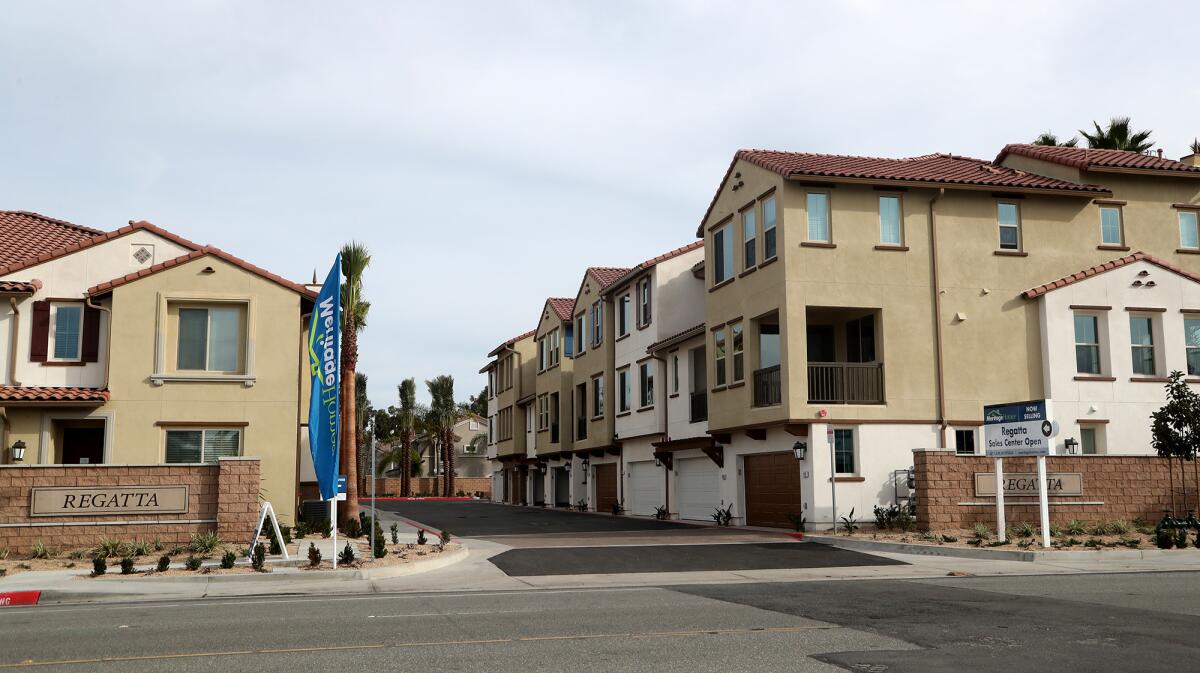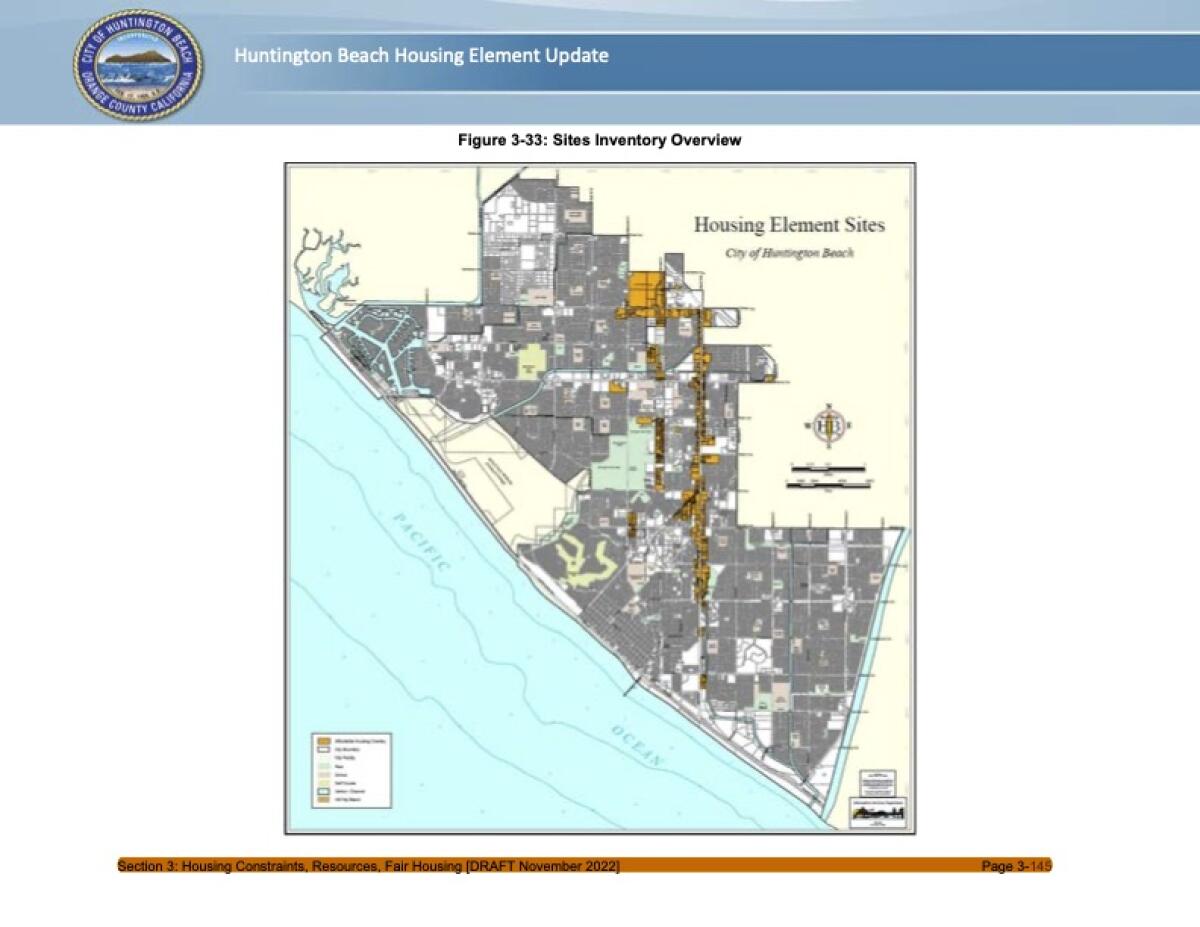Huntington Beach City Council again postpones housing element action

- Share via
The city of Huntington Beach’s general plan housing element update, due to have been completed last October but kicked down the road to December — only to be put on hold again then by a newly seated City Council — was set for a vote Tuesday night.
It did not get approved.
Instead, the council voted to bring back the plan for further discussion at its next regular meeting on April 4, after a motion by Councilman Dan Kalmick to approve an environmental impact report related to the plan failed 3-3.
Kalmick and Councilwomen Natalie Moser and Rhonda Bolton voted to approve the EIR, while Mayor Tony Strickland, Mayor Pro Tem Gracey Van Der Mark and Councilman Pat Burns voted against.
Councilman Casey McKeon recused himself from the vote due to a potential conflict of interest. He said he owns property within 1,000 feet of one of the zoning items and had not received a final opinion from the California Fair Political Practices Commission on his involvement.
The panel took each of the elements of the plan individually for approval. First, it voted 4-2 to accept applications for accessory dwelling unit (ADU) projects as allowed for in Senate Bill 9.
A total of 487 ADUs are a necessary part of the housing element as currently proposed, and the state sued Huntington Beach earlier this month after the city had stopped accepting those applications.
Strickland and Van Der Mark balked at the next item, however, which required the City Council to sign off on the zoning despite “significant and unavoidable” California Environmental Quality Act concerns including air quality, greenhouse gas emissions, hydrology and water quality, noise and utilities and service systems.
Huntington Beach would have to submit to the Department of Housing and Community Development a statement of overriding considerations, declaring that it finds that the overriding economic, legal, social, technological or other benefits of the project outweigh the environmental impact.
“The state is violating our 1st Amendment rights, by forcing us to say that these mandated housing projects are more important than the impacts to the environment,” Strickland said, reading from a prepared statement. “I can’t in good conscience have my speech forced to sign a statement of overriding considerations because it goes against everything I stand for ... This is an easy vote for me.”
He called the state’s housing mandates a war against suburbia and a war against the automobile.
Van Der Mark echoed the claim that Sacramento is attacking Huntington Beach residents, who she said have been “cornered.”
“We have to choose between giving up clean air to breathe, compromising our water supply, giving up the safety of our community, sacrificing our wetlands — or we will be fined,” she said.

Kalmick countered that the CEQA requirements “hit every edge case that can possibly occur” and noted that the environmental act was signed into law by conservative Ronald Reagan when he was governor.
“This is not some Sacramento, Newsom-onian push,” he said, referencing Gov. Gavin Newsom. “CEQA is an informational document, not necessarily a policy document. To say that we’re being forced into saying those things are true, I don’t necessarily think that’s the case ... I’m disappointed that this new council, who had quite a bit of time during the campaign to review the housing element, needed another four months to come back to the exact same point of kind of copping out on a technicality.”
Strickland said he would consider approving the housing element if there wasn’t the statement of overriding considerations. City Manager Al Zelinka recommended discussing the implications and potential paths forward in closed session.
“I’m very open,” Strickland said. “My whole philosophy was to move forward with the state, while we take this to court.”
The council agreed to table the housing element until its next meeting on a 5-1 vote, with Councilman Pat Burns opposed.
The state has required Huntington Beach to zone for 13,368 units during the current Regional Housing Needs Allocation cycle. Under staff’s plan, 44% of those would be very-low or low-income housing, with an annual family income range that maxes out at $108,400.
Much of that affordable housing would be built using zoning overlays, largely along Beach Boulevard.
City could face financial penalties
Some have argued that the city should first get the housing element certified before fighting Sacramento. But city leaders announced a federal lawsuit against the state on March 9, arguing that state housing laws violate Surf City’s rights to zone property.
“The fact that we did this in the opposite timeline, I don’t understand,” Moser said. “It doesn’t set us up for success ... If you don’t like a loss of local control, then you’re really not going to like the potential ramifications of not adopting a housing element.”
Ursula Luna-Reynosa, the city’s director of community development, outlined the consequences of failing to obtain certification from the state Department of Housing and Community Development during a presentation Tuesday night. They include financial penalties and a possible loss of permitting authority.
Though the city’s federal lawsuit is still pending, on Tuesday a federal court judge rejected the city’s request for a temporary restraining order that would bar the state from enforcing fines and penalties related to failed compliance with housing laws.
Central District Judge Fred Slaughter ruled that Huntington Beach failed to meet the requirements for ex parte relief. Additionally, he found that the city has not met its burden for establishing a likelihood of success as to each of the claims in the complaint.
“I applaud the court for today’s decision denying Huntington Beach’s latest attempt to block their city’s residents from accessing crucial housing opportunities afforded by state law,” state Atty. Gen. Rob Bonta said in a statement Tuesday. “The California Department of Justice will continue to fight to increase housing supply throughout the state and hold Huntington Beach accountable to state law.”
All the latest on Orange County from Orange County.
Get our free TimesOC newsletter.
You may occasionally receive promotional content from the Daily Pilot.










